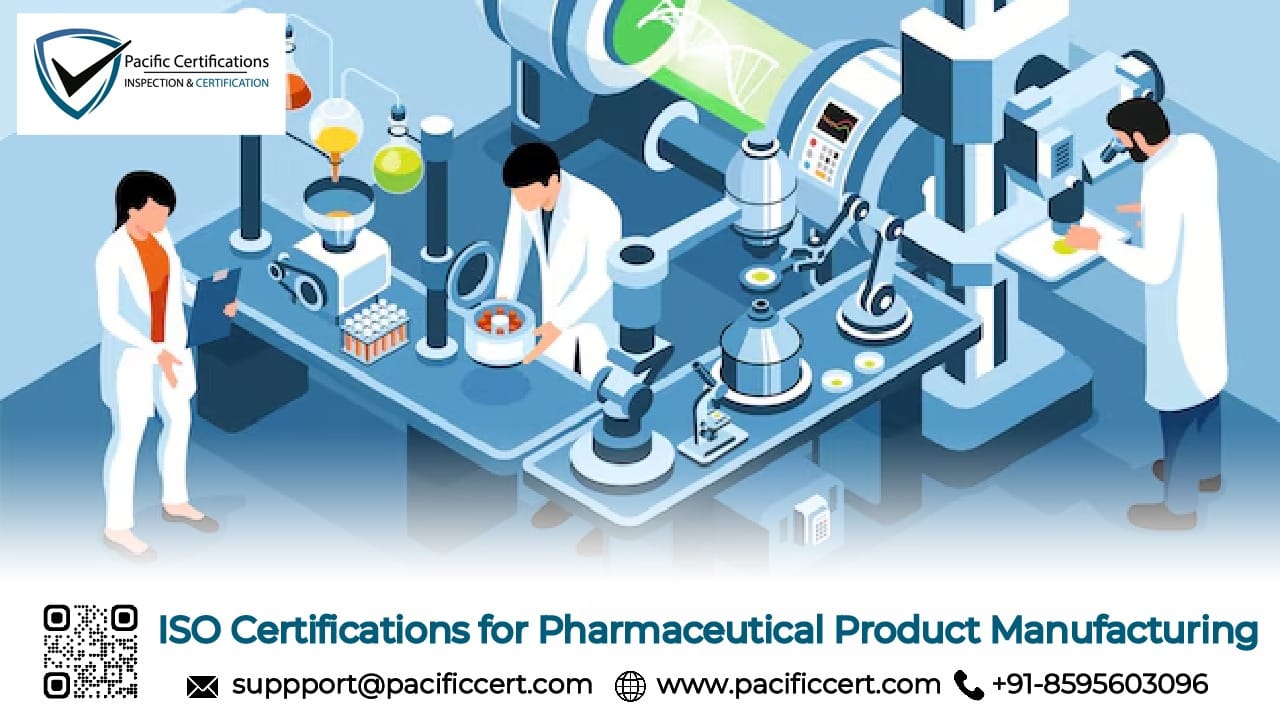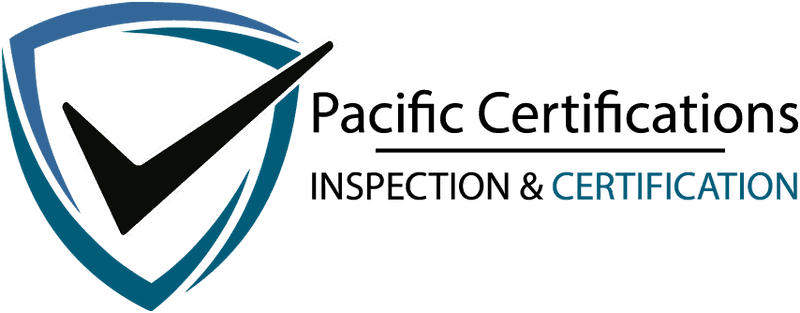ISO Certifications for Pharmaceutical Product Manufacturing Businesses, Requirements and Benefits

Introduction
Pharmaceutical product manufacturing is a sector where quality and safety are non-negotiable. From producing everyday medicines to advanced therapies, companies are expected to operate under strict regulatory oversight. A single error in production, packaging, or storage can compromise patient safety and invite legal consequences.
The global pharmaceutical manufacturing market is projected to grow at around 7% through 2030, supported by increasing demand for generics, biologics, and vaccines. At the same time, there is growing scrutiny from healthcare providers and patients who expect not only safe products but also transparent systems.
ISO certifications give pharmaceutical manufacturers a recognized way to organize their processes, reduce risks, and provide evidence of compliance with international standards.
Reach out to us at [email protected] for all your ISO certification needs. Our experts are ready to assist you!
Pharmaceutical manufacturing is one of the most closely regulated industries in the world, where ISO certifications help companies prove safety, quality, and accountability at every stage of production.
Quick Summary
ISO certifications help pharmaceutical manufacturers prove quality, safety, and compliance. Key standards include ISO 9001 (quality), GMP (mandatory in pharma), ISO 13485(medical devices), ISO 14001 (environment), and ISO 45001 (safety). Certification builds regulatory confidence, reduces risks, and strengthens trust with both patients and partners in one of the most highly regulated industries.
Applicable ISO Standards for Pharmaceutical Product Manufacturing
A variety of ISO certifications apply specifically to pharmaceutical product manufacturing, each addressing unique aspects of the production lifecycle:
Standard | Focus Area | Relevance |
|---|---|---|
ISO 9001:2015 | Quality Management | Ensures consistent production and documentation across facilities. |
ISO 13485:2016 | Quality for Medical Devices | Critical for companies producing medical devices alongside pharmaceuticals. |
ISO 14001:2015 | Environmental Management | Guides waste management, pollution control, and sustainability in production. |
ISO 45001:2018 | Occupational Health & Safety | Protects workers handling chemicals, machinery, and high-risk environments. |
ISO/IEC 27001:2022 | Information Security | Secures sensitive data, including R&D and clinical trial information. |
ISO 50001:2018 | Energy Management | Improves efficiency in energy-intensive manufacturing plants. |
ISO 22301:2019 | Business Continuity | Ensures supply chains and operations continue during crises. |
ISO 37001:2016 | Anti-Bribery Management | Addresses ethical practices in procurement and compliance. |
GMP (Good Manufacturing Practices) | Production Standards | Required for regulatory approval of pharmaceuticals worldwide. |
ISO 9001: Quality Management Systems
ISO 9001 establishes a framework for quality management systems (QMS) that ensures consistent product quality and customer satisfaction. In the pharmaceutical sector, this standard helps maintain GMP compliance while focusing on process improvement.
ISO 13485: Medical Devices QMS
Although primarily designed for medical devices, ISO 13485 is also relevant to pharmaceutical companies producing combination products (e.g., drug-device hybrids). It emphasizes risk management and regulatory compliance throughout the product lifecycle.
ISO 14001: Environmental Management Systems
Pharmaceutical manufacturing often involves hazardous chemicals and waste. ISO 14001 provides a framework for managing environmental impact, ensuring sustainability, and complying with environmental regulations.
ISO 45001: Occupational Health and Safety
Safety is paramount in pharmaceutical manufacturing environments. ISO 45001 ensures robust health and safety management systems to protect employees and minimize workplace risks.
ISO 17025: Testing and Calibration Laboratories
For pharmaceutical manufacturers with in-house testing laboratories, ISO 17025 ensures the accuracy, reliability, and consistency of testing procedures.
ISO 15378: Primary Packaging Materials for Medicinal Products
This standard is specific to suppliers of pharmaceutical packaging materials. It integrates GMP principles with quality management, ensuring packaging safety and integrity.
ISO 27001: Information Security Management Systems
Pharmaceutical companies handle sensitive data, including clinical trials and patient information. ISO 27001 safeguards this data, ensuring compliance with cybersecurity standards and regulations.
ISO 22301: Business Continuity Management Systems
In an industry where downtime can be critical, ISO 22301 helps pharmaceutical companies maintain operational resilience during disruptions.
Click here to find out more applicable standards to your industry
As a trusted certification body, Pacific Certifications specializes in conducting audits and issuing ISO certifications for pharmaceutical product manufacturing. Our team of experienced auditors ensures a smooth and efficient certification process by verifying your compliance with the required standards.
Contact us via [email protected] to schedule a professional audit tailored to your pharmaceutical manufacturing processes.
What are the requirements of ISO Certifications for Pharmaceutical Product Manufacturing?
To achieve ISO certification in pharmaceutical product manufacturing, organizations must meet specific requirements tailored to each standard. Below, we outline the key requirements of each applicable ISO standard, emphasizing their role in ensuring safety and compliance:
General requirements:
Defining scope of operations: Companies must specify whether they manufacture APIs (active pharmaceutical ingredients), finished products, biologics, or medical devices.
Policies and objectives: Written policies on product quality, safety, and compliance with regulatory standards must be established.
Risk assessments: Manufacturers must identify and control risks such as contamination, cross-batch errors, equipment failures, and supply chain disruptions.
Process documentation: All manufacturing activities—from raw material handling to packaging—should be standardized and traceable.
Workforce training: Staff must be trained on GMP, hygiene standards, equipment handling, and emergency procedures.
Record management: Complete logs of production, testing, quality checks, and incidents must be maintained for audits.
Performance tracking: Indicators such as batch rejection rates, downtime, energy use, and customer complaints should be monitored.
Audits and reviews: Internal audits and periodic management reviews ensure compliance and highlight areas for improvement.
Specific requirements:
ISO 9001: Quality Management Systems (QMS)
- Leadership Commitment: Top management must demonstrate leadership and commitment to implementing the QMS.
- Risk-Based Thinking: Identify and address risks and opportunities affecting product quality.
- Process Approach: Develop, monitor, and optimize processes to ensure efficiency and consistency.
- Documentation: Maintain documented information, including policies, procedures, and records of quality objectives.
- Customer Focus: Meet customer requirements consistently while enhancing customer satisfaction.
- Continuous Improvement: Regularly review and improve processes to ensure ongoing compliance.
ISO 13485: Medical Devices QMS
- Risk Management: Implement a risk management system to identify, evaluate, and control risks associated with medical devices.
- Regulatory Compliance: Comply with applicable regulatory requirements throughout the product lifecycle.
- Validation and Verification: Ensure all manufacturing and testing processes are validated and verified.
- Traceability: Maintain complete traceability of materials, components, and products.
- Supplier Controls: Assess and monitor suppliers to ensure they meet quality and safety standards.
ISO 14001: Environmental Management Systems
- Environmental Policy: Develop and maintain a policy outlining the organization’s commitment to environmental protection.
- Compliance Obligations: Identify and comply with all applicable legal and regulatory environmental requirements.
- Environmental Objectives: Set measurable objectives to reduce waste, emissions, and resource consumption.
- Lifecycle Perspective: Consider the environmental impact of products throughout their lifecycle.
- Monitoring and Reporting: Regularly monitor environmental performance and report findings.
ISO 45001: Occupational Health and Safety
- Hazard Identification: Identify workplace hazards and assess associated risks.
- Employee Training: Train employees on safety protocols and emergency response procedures.
- Safety Policy: Establish a comprehensive health and safety policy.
- Incident Management: Develop procedures for reporting, investigating, and addressing workplace incidents.
- Legal Compliance: Ensure compliance with health and safety regulations.
ISO 17025: Testing and Calibration Laboratories
- Competence: Employ qualified personnel and ensure the competency of laboratory staff.
- Method Validation: Validate testing and calibration methods to ensure reliability.
- Equipment Maintenance: Maintain and calibrate laboratory equipment regularly.
- Traceability: Ensure measurement traceability to national or international standards.
- Quality Assurance: Implement quality control measures to verify the accuracy of test results.
ISO 15378: Primary Packaging Materials for Medicinal Products
- Risk Assessment: Identify and control risks associated with packaging materials.
- Material Traceability: Maintain full traceability of raw materials used in packaging.
- Defect Prevention: Implement measures to prevent contamination, defects, and quality issues.
- Supplier Management: Evaluate and monitor suppliers of packaging materials.
- Regulatory Alignment: Ensure packaging complies with relevant regulatory requirements.
ISO 27001: Information Security Management Systems
- Information Security Policy: Develop a policy to address information security risks.
- Risk Management: Identify, evaluate, and mitigate risks to information security.
- Access Control: Restrict access to sensitive data to authorized personnel only.
- Incident Response: Establish procedures for responding to security breaches or data incidents.
- Compliance: Meet legal and regulatory requirements for data protection.
Tip: Pharmaceutical companies should start with ISO 9001 as a foundation, then add GMP compliance and ISO 13485 if medical devices are part of production. Larger facilities often integrate ISO 14001 and ISO 45001 to manage environmental and workplace safety responsibilities.
For expert guidance on certification, reach out to Pacific Certifications at [email protected].
What are the benefits of ISO Certifications for Pharmaceutical Product Manufacturing?
Certification brings practical and reputational advantages:
Reliable product quality: ISO 9001 and GMP ensure consistent standards across all batches.
Stronger regulatory confidence: Certification provides clear evidence during FDA, EMA, or local authority inspections.
Patient safety assurance: Structured systems reduce the risk of contamination or defective products reaching the market.
Workforce protection: ISO 45001 ensures a safer environment for employees handling hazardous materials.
Sustainable practices: ISO 14001 and ISO 50001 support reduced energy use, emissions, and waste.
Supply chain resilience: ISO 22301 helps maintain production during disruptions such as raw material shortages or global crises.
Market advantage: Many buyers, hospitals, and government contracts prefer or require certified suppliers.
Ethical credibility: ISO 37001 promotes fair practices in procurement and partnerships.
The sector is evolving quickly. The push for biologics and personalized medicine has increased demand for advanced manufacturing facilities with strict quality controls. The COVID-19 pandemic highlighted the importance of supply chain resilience, making ISO 22301 more relevant than ever.
Sustainability is another major trend. Pharmaceutical plants are under pressure to reduce their environmental footprint, with ISO 14001 and ISO 50001 supporting eco-friendly manufacturing and energy efficiency. At the same time, digitalization and automation in pharma require stronger controls around information security, raising the importance of ISO/IEC 27001.
The global market is projected to reach nearly USD 900 billion by coming years, with Asia-Pacific leading growth due to expanding manufacturing hubs in India and China. For companies operating internationally, ISO certifications not only provide credibility but also open access to highly regulated markets.
How Pacific Certifications can help?
Pacific Certifications is accredited by ABIS provides auditing and certification services for pharmaceutical manufacturers. Our certification covers ISO 9001, ISO 13485, ISO 14001, ISO 45001, GMP, and more, helping organizations meet global requirements while building trust with regulators, partners, and patients.
If you need support with ISO certification for your Pharmaceutical Product Manufacturing business, contact us at [email protected] or +91-8595603096.
FAQs: ISO Certifications for Pharmaceutical Product Manufacturing
What are ISO certifications, and why are they important in pharmaceutical manufacturing?
ISO certifications are international standards that ensure quality, safety, and efficiency. In pharmaceutical manufacturing, they guarantee product consistency, regulatory compliance, and customer trust.
Which ISO standards are most relevant for pharmaceutical product manufacturing?
ISO 9001, ISO 13485, ISO 14001, ISO 45001, ISO 17025, ISO 15378, and ISO 27001 are highly relevant for ensuring quality, safety, and compliance in pharmaceutical production.
How does ISO certification benefit pharmaceutical companies?
ISO certification enhances product quality, ensures regulatory compliance, reduces risks, and boosts market credibility, making companies more competitive globally.
Can Pacific Certifications assist with ISO implementation?
No, Pacific Certifications focuses on audits and certification issuance. We do not provide consultancy, training, or implementation services.
Is ISO 15378 mandatory for pharmaceutical packaging manufacturers?
While not mandatory, ISO 15378 is highly recommended for manufacturers of primary pharmaceutical packaging as it ensures GMP compliance and packaging integrity.
How can I apply for ISO certification with Pacific Certifications?
Reach out to us at [email protected]. Our team will guide you through the certification process and conduct audits to assess compliance with the relevant ISO standards.
Written by: Ashish
Read More at: Blogs by Pacific Certifications

